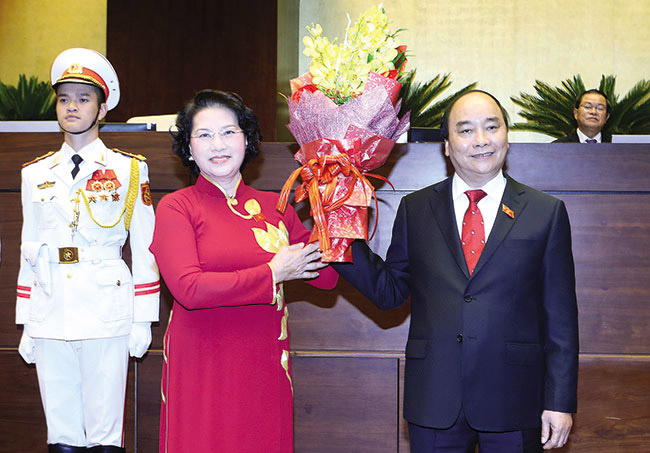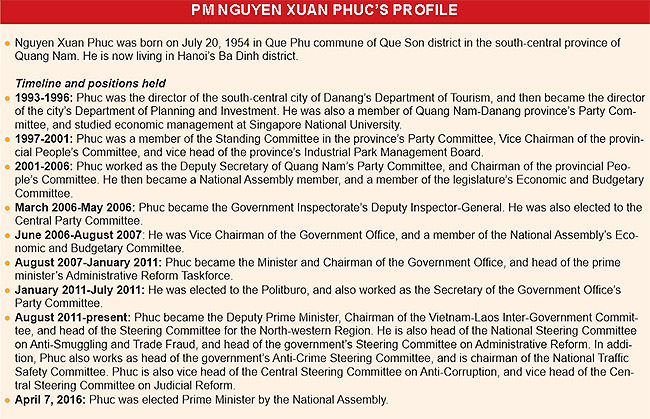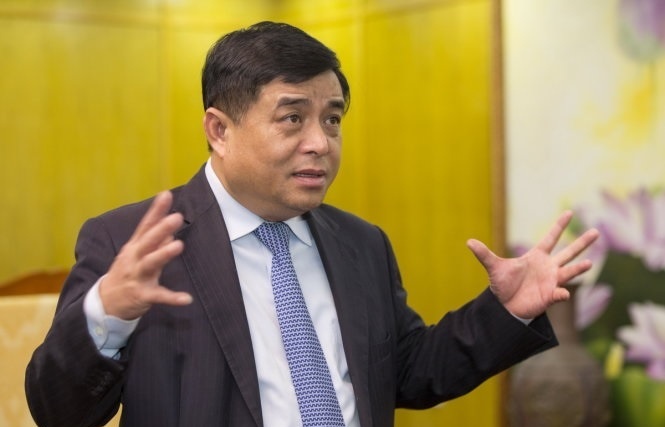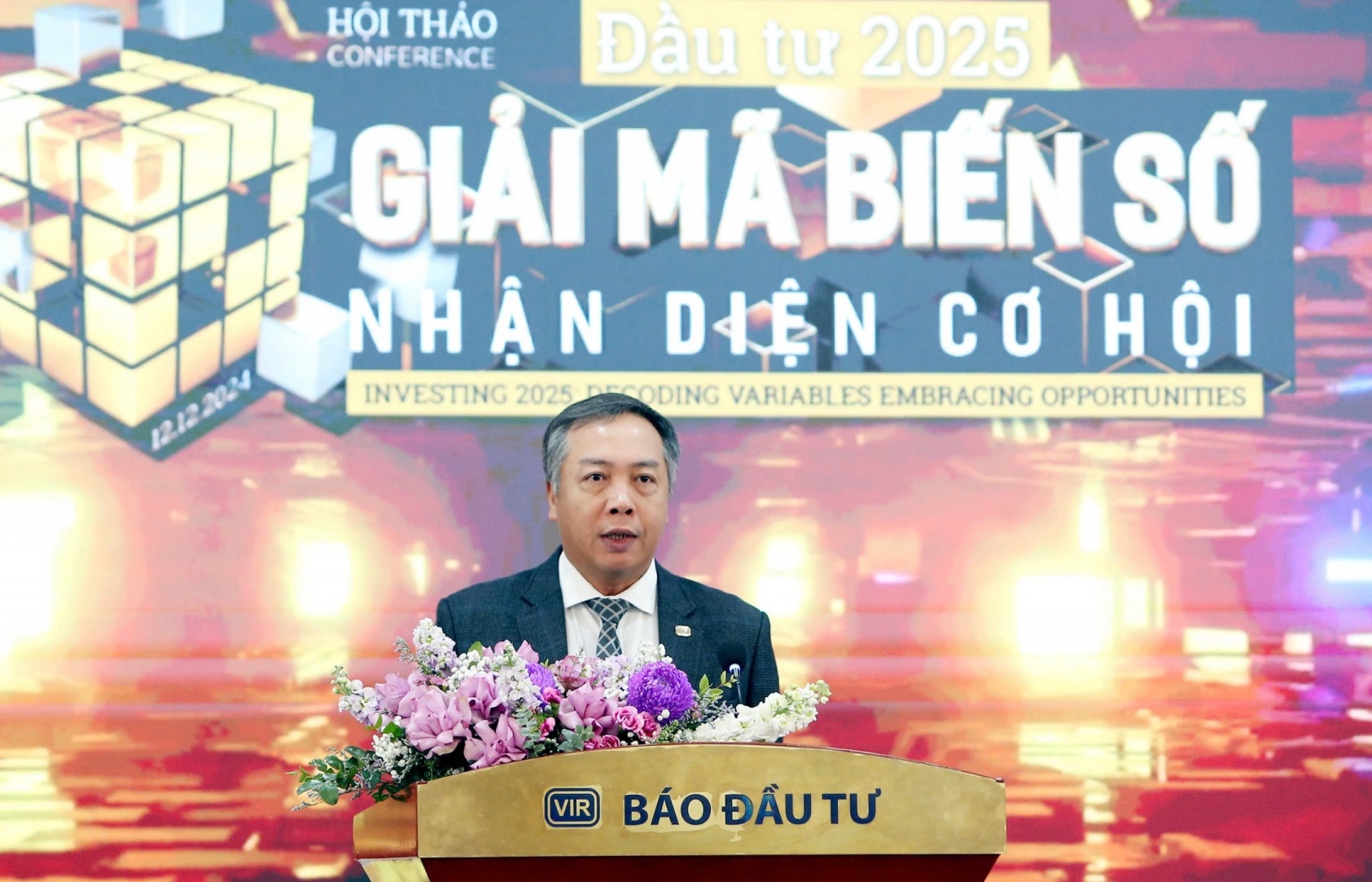Newly elected PM Phuc takes office
 |
 |
> Cabinet members vow to foster reforms
Last Thursday, the National Assembly elected Deputy Prime Minister Nguyen Xuan Phuc as the country’s new Prime Minister, with 446 out of 490 votes (90.2 per cent) in favour.
Replacing Nguyen Tan Dung who served as the Prime Minister for nearly a decade, Phuc, 62, will remain in office until 2020.
With the election of Phuc, Vietnam has filled all of its top leadership positions. After Nguyen Phu Trong was re-elected as the country’s Communist Party General Secretary for a second term during the 12th National Party Congress in late January, the National Assembly elected its Vice Chairwoman, Nguyen Thi Kim Ngan, as Chairwoman on March 31, as well as top-ranking general and Minister of Public Security Tran Dai Quang as the new State President on April 2.
After the vote, Phuc took the oath of office. He said becoming the Prime Minister was “a great honour and also a heavy responsibility” that the Party, the state, and the people have given to him. “I will do my best to serve my country and people, and work towards the goal of building the Socialist Republic of Vietnam into a prosperous, strong, democratic, fair, and civilised nation.”
Phuc stressed that he, together with other cabinet members, would build up a strong, united, efficient, and effective government, undertaking “drastic actions to serve the Vietnamese people, and successfully accomplish government tasks under the Constitution and the law.”
He also promised that the government and the prime minister would do their utmost to “overcome shortcomings and weaknesses in order to achieve all of Vietnam’s socio-economic development goals, expanding the nation’s Doi moi and international integration.”
The National Assembly has set a target of achieving an annual growth rate of 6.5-7 per cent during 2016-2020, higher than the average annual rate of 5.9 per cent in the 2011-2015 period. The growth rate for 2016 is targeted at 6.7 per cent.
Through 2020, GDP per capita is expected to be $3,200-3,500, higher than last year’s figure of $2,109.
“Focus will be placed on administrative reform, creating a favourable business climate, enhancing democracy, and strengthening discipline in the state’s administrative apparatus and in society in general,” Phuc stressed. “Efforts will also be made to further increase effectiveness in our actions against corruption and wastefulness, and to resolutely endeavour to protect national independence, sovereignty, unity, and territorial integrity.”
Phuc also told the media that during his tenure, the government would continue stabilising the macro-economy, beefing up economic growth and administrative reform, and creating more favourable conditions for the development of businesses.
The government will also continue encouraging startups and creative freedom, giving benefits to Vietnam’s talented people and mobilising its resources for development. The government will also keep working to raise the standard of living for its citizens, while ensuring their safety and security. In the short term, the government will focus on improving conditions for people in areas hit by natural disasters, drought, and saltwater intrusion, as well as ensuring food hygiene and safety.
Many National Assembly members, such as Nguyen Cong Hong representing the southern province of Dong Nai, highly commended Phuc, saying that he had a lot of experience in various positions.
“I want that Phuc and the new government will intensify crack-downs on corruption, as he has vowed,” Hong said.
Meanwhile, deputy Bui Duc Thu from the northern province of Lai Chau expects Phuc to lead the new government cabinet to separate the regulatory and commercial activities of the state by transforming the role of the state in the economy from a producer to an effective regulator and facilitator.
“In the past, the state performed as a regulator, a producer, and a trader. It also engaged directly in economic activities through state-owned enterprises, particularly through large state companies, and indirectly through close links between the state and an exclusive segment of the domestic private sector,” Thu said.
What the stars mean:
★ Poor ★ ★ Promising ★★★ Good ★★★★ Very good ★★★★★ Exceptional
Latest News
More News
- VIR event to hear expert views on investing for 2025 (December 11, 2024 | 15:41)
- Google to make its debut in Vietnam (December 06, 2024 | 19:10)
- Nvidia to build two AI centres in Vietnam (December 06, 2024 | 15:27)
- Vietnam poised to lead Southeast Asia's e-commerce revolution (December 03, 2024 | 17:36)
- Economy on track to end year on upbeat note: UOB (December 03, 2024 | 08:46)
- Manufacturing sector remains in growth territory (December 02, 2024 | 16:21)
- More vigorous 2025 in sight for M&A deals (December 02, 2024 | 10:30)
- M&A market set to boom again in 2025 (November 28, 2024 | 10:40)
- Vietnam M&A Forum 2024 reveals new opportunities (November 27, 2024 | 15:42)
- Pathways for transitioning to EVs in Vietnam (November 26, 2024 | 13:54)















 Mobile Version
Mobile Version